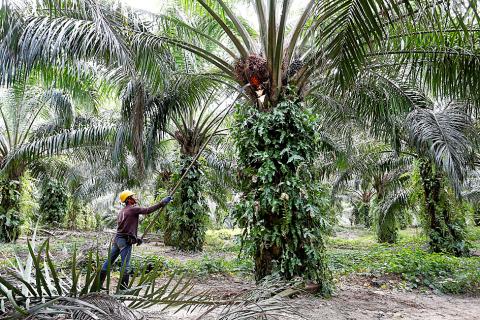Scientists in Malaysia have said they were “stunned” to discover monkeys regularly killing and eating rats on palm oil plantations, providing a natural anti-pest measure in the country, which is responsible for 30 percent of the world’s palm oil production.
A report released on Monday in Current Biology showed that southern pig-tailed macaques, generally thought to eat mainly fruit plus occasionally lizards and birds, foraged for rats on plantations.
REDUCED LOSSES

Photo: Reuters
The authors said that the monkeys’ appetite for rodents showed that rather than being pests, as is commonly believed, the primates’ presence reduced crop losses.
“I was stunned when I first observed that macaques feed on rats in plantations,” said Nadine Ruppert, senior zoology lecturer at University Sains Malaysia, who cowrote the report. “I did not expect them to hunt these relatively large rodents or that they would even eat so much meat.”
The report monitored macaques between January 2016 and September last year in plantations around Malaysia’s Segari Melintang forest reserve.
It showed that each of the monitored macaque groups, featuring an average of 44 monkeys, killed about 3,000 rats each year.
Rats are estimated to damage an average of 10 percent of oil palm crops by eating its fruit, compared with the macaques, which damage 0.54 percent.
As a result, the rat-eating monkeys help save crops, the authors said.
Malaysia produces about 19.5 million tonnes of palm oil per year — the world’s most popular vegetable oil — making it one of the biggest producers of the product globally.
MAIN INGREDIENT
It is used in many products, from shampoo to lipstick to bread and chocolate.
It is also a cleaning agent and is used as a component in fuels such as biodiesel.
Plantations’ effects on forests and peatlands and the wild animals that live there have made them hugely controversial. Large areas are often burned and cleared to make way for the plantations, releasing large amounts of carbon dioxide into the atmosphere.
Southern pig-tailed macaques are listed as vulnerable by the International Union for Conservation of Nature, but are regularly shot by palm oil plantation staff in Malaysia.
The authors hope their findings will help reduce such behavior and promote a “win-win solution.”
“Our results suggest important opportunities for mitigating human-wildlife conflicts,” they wrote.
“Farmers and palm oil companies are encouraged to protect primates in their natural habitat via wildlife corridors between forest patches and viable interfaces between forests and plantations,” they added.

Malaysia yesterday installed a motorcycle-riding billionaire sultan as its new king in lavish ceremonies for a post seen as a ballast in times of political crises. The coronation ceremony for Malaysia’s King Sultan Ibrahim, 65, at the National Palace in Kuala Lumpur followed his oath-taking in January as the country’s 17th monarch. Malaysia is a constitutional monarchy, with a unique arrangement that sees the throne change hands every five years between the rulers of nine Malaysian states headed by centuries-old Islamic royalty. While chiefly ceremonial, the position of king has in the past few years played an increasingly important role. Royal intervention was

X-37B COMPARISON: China’s spaceplane is most likely testing technology, much like US’ vehicle, said Victoria Samson, an official at the Secure World Foundation China’s shadowy, uncrewed reusable spacecraft, which launches atop a rocket booster and lands at a secretive military airfield, is most likely testing technology, but could also be used for manipulating or retrieving satellites, experts said. The spacecraft, on its third mission, was last month observed releasing an object, moving several kilometers away and then maneuvering back to within a few hundred meters of it. “It’s obvious that it has a military application, including, for example, closely inspecting objects of the enemy or disabling them, but it also has non-military applications,” said Marco Langbroek, a lecturer in optical space situational awareness at Delft

The Philippine Air Force must ramp up pilot training if it is to buy 20 or more multirole fighter jets as it modernizes and expands joint operations with its navy, a commander said yesterday. A day earlier US National Security Adviser Jake Sullivan said that the US “will do what is necessary” to see that the Philippines is able to resupply a ship on the Second Thomas Shoal (Renai Shoal, 仁愛暗沙) that Manila uses to reinforce its claims to the atoll. Sullivan said the US would prefer that the Philippines conducts the resupplies of the small crew on the warship Sierra Madre,

AIRLINES RECOVERING: Two-thirds of the flights canceled on Saturday due to the faulty CrowdStrike update that hit 8.5 million devices worldwide occurred in the US As the world continues to recover from massive business and travel disruptions caused by a faulty software update from cybersecurity firm CrowdStrike, malicious actors are trying to exploit the situation for their own gain. Government cybersecurity agencies across the globe and CrowdStrike CEO George Kurtz are warning businesses and individuals around the world about new phishing schemes that involve malicious actors posing as CrowdStrike employees or other tech specialists offering to assist those recovering from the outage. “We know that adversaries and bad actors will try to exploit events like this,” Kurtz said in a statement. “I encourage everyone to remain vigilant